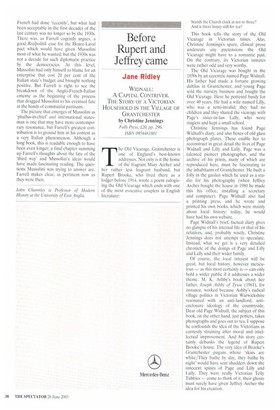Before Rupert and Jeffrey came
Jane Ridley
WIDNALL: A CAPITAL CONTRIVER. THE STORY OF A VICTORIAN HOUSEHOLD IN THE VILLAGE OF GRANTCHESTER by Christine Jennings Folly Press, £20, pp. 296, ISBN 0954481801 The Old Vicarage, Grantchester is one of England's best-known addresses. Not only is it the home
of the fragrant Mary Archer and her rather less fragrant husband. but Rupert Brooke, who lived there as a lodger before 1914, wrote a poem eulogising the Old Vicarage which ends with one of the most evocative couplets in English literature:
Stands the Church clock at ten to three? And is there honey still for tea?
This book tells the story of the Old Vicarage in Victorian times. Alas, Christine Jennings's spare, clinical prose undercuts any pretensions the Old Vicarage might have to a romantic past. On the contrary, its Victorian inmates were rather odd and very worthy.
The Old Vicarage was bought in the 1850s by an eccentric named Page Widnall. His father had made a fortune growing dahlias in Grantchester, and young Page sold the nursery business and bought the Old Vicarage. Here he pottered busily for over 40 years. He had a wife named Lilly, who was a semi-invalid; they had no children and they shared the vicarage with Page's sister-in-law Lally, who wore ringlets and kept a small school.
Christine Jennings has found Page Widnall's diary, and also boxes of old glass photograph plates. These enable her to reconstruct in great detail the lives of Page Widnall and Lilly and Lally. Page was a talented pioneer photographer, and the archive of his prints, many of which are reproduced here, must be fascinating to the inhabitants of Grantchester. He built a folly in the garden which he used as a studio for his photography (when Jeffrey Archer bought the house in 1980 he made this his office, installing a secretary and computer). Page Widnall also had a printing press, and he wrote and printed his own books, which were mainly about local history; today, he would have had his own website.
Page Widnall's brief, factual diary gives no glimpse of his internal life or that of his relatives, and, probably wisely, Christine Jennings does not attempt to speculate. Instead, what we get is a very detailed chronicle of the doings of Page and Lilly and Lally and their wider family.
Of course, the local interest will be great, but local history, however meticulous — as this most certainly is — can only hold a wider public if it addresses a wider theme. M. K. Ashby's book about her father, Joseph Ashby of Tysoe (1961), for instance, worked because Ashby's radical village politics in Victorian Warwickshire resonated with an anti-landlord, antienclosure ideology of the countryside. Dear old Page Widnall, the subject of this book, on the other hand. just potters, takes photographs and goes out to tea. I suppose he confounds the idea of the Victorians as earnestly straining after moral and intellectual improvement. And his story certainly debunks the legend of Rupert Brooke's house. The very idea of Brooke's Grantchester pagans whose 'skins are white;/They bathe by day, they bathe by night' would have sent shudders down the innocent spines of Page and Lilly and Lally. They were really Victorian Telly Tubbies — come to think of it, their ghosts must surely have given Jeffrey Archer the idea for his creation.


































































 Previous page
Previous page